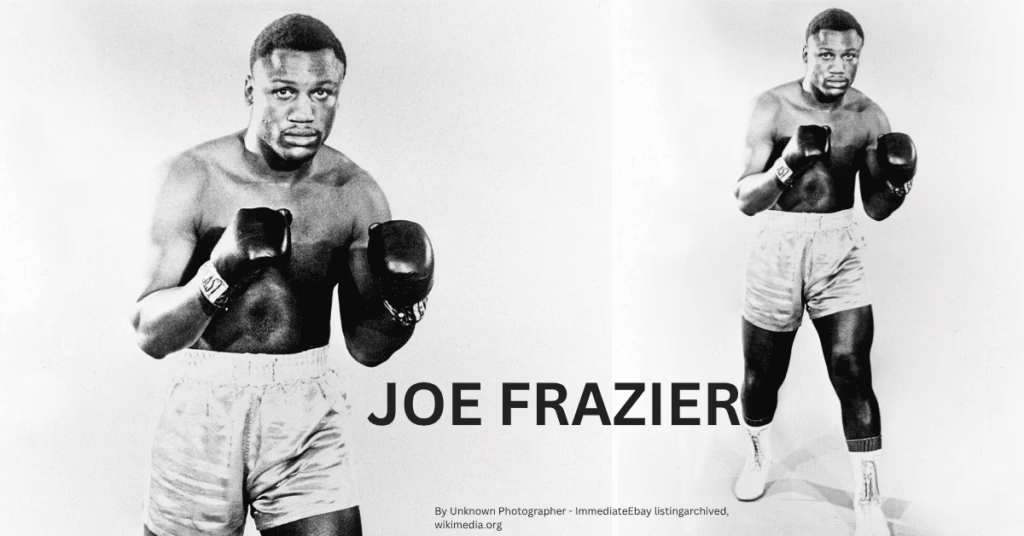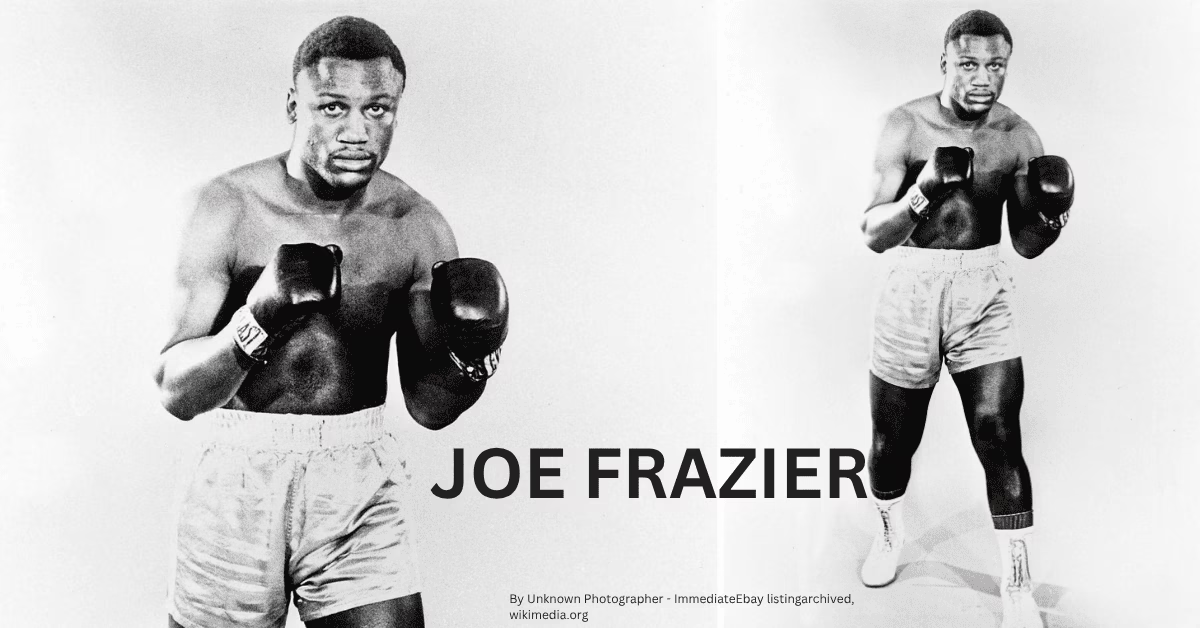Early Life
Joe Frazier was born on January 12, 1944, in Beaufort, South Carolina, into a poor farming family. He was the youngest of 12 children, and life was a constant struggle. Growing up in the segregated South, Frazier faced both racial and economic hardships. His father was a sharecropper, and the family had to make do with very little.
As a teenager, Frazier moved to Philadelphia, Pennsylvania, a city that would shape the boxer he would become. Working in a slaughterhouse, he would punch hanging sides of beef during breaks—a scene that would later inspire the iconic training montage in the movie Rocky. It was in Philly where Joe found boxing as both an escape and a purpose.
He joined the Police Athletic League gym, and under trainer Yancey “Yank” Durham, Frazier began developing his signature relentless pressure style. By 1964, he won a gold medal at the Tokyo Olympics after his opponent withdrew due to injury. The Olympic win marked the beginning of his incredible professional boxing journey.

Challenges
Joe Frazier’s boxing legacy was forged not just through triumphs but through enormous adversity. His toughest opponent, both in and out of the ring, was often Muhammad Ali—an icon who challenged Frazier’s character, mocked him publicly, and created one of the sport’s fiercest rivalries.
While Frazier was the champion during Ali’s exile due to draft resistance, he was never fully embraced by the Black community as Ali was. Despite his blue-collar background and humble roots, Frazier was seen as the “establishment” fighter. Ali dubbed him “Uncle Tom,” a smear that deeply wounded Frazier and impacted his mental health.
Outside the ring, Frazier faced financial difficulties later in life. Though he earned millions, he lost much of his fortune due to poor investments and legal disputes. Health issues—including vision loss in his left eye during the height of his career—made his achievements even more impressive.
Top Fights
Joe Frazier vs. Muhammad Ali I – “The Fight of the Century” (1971):
Held at Madison Square Garden, this clash of titans pitted undefeated heavyweights against one another. Frazier, the reigning champ, and Ali, returning from a 3.5-year ban, fought an epic 15-round war. In the final round, Frazier floored Ali with his signature left hook. He won a unanimous decision and handed Ali his first professional loss. The bout is still considered one of the greatest in boxing history.
Frazier vs. George Foreman (1973):
Frazier’s undefeated reign ended violently when George Foreman knocked him down six times in two rounds. The loss exposed Frazier’s vulnerability to power punchers and cost him the title.
Frazier vs. Ali II (1974):
Though less celebrated, the rematch was still brutal. Ali avenged his earlier loss with a narrow decision, setting the stage for their final encounter.
Frazier vs. Ali III – “The Thrilla in Manila” (1975):
This final installment of their trilogy was a savage, soul-draining battle. After 14 brutal rounds, Frazier’s trainer stopped the fight. Ali later said, “It was the closest thing to dying that I know.” Frazier, nearly blind, had refused to quit—his heart as fierce as his fists.
Controversies
While not known for scandals like some of his peers, Frazier’s life was not without drama. His feud with Muhammad Ali was more than a boxing rivalry—it became a deeply personal and painful relationship. Despite helping Ali regain his license and publicly supporting him, Frazier was ridiculed by Ali for years.
Frazier’s bitterness lingered long after their careers ended. While Ali later apologized, the wounds took time to heal. Their relationship thawed eventually, and Frazier was at Ali’s side during his later years.
Frazier also struggled with financial management. Despite earning millions, he filed for bankruptcy in the early 2000s. His modest lifestyle in later years contrasted sharply with his once superstar status.
Family
Joe Frazier was a devoted father to 11 children. His son, Marvis Frazier, also became a professional heavyweight boxer but never reached his father’s legendary heights. Joe’s daughter, Jacqui Frazier-Lyde, followed in his footsteps and even fought Muhammad Ali’s daughter, Laila Ali, in a high-profile women’s boxing match in 2001.
Frazier valued family, discipline, and hard work, qualities he passed on to his children. He remained close to his family until his death.
Net Worth
At the height of his career, Joe Frazier made over $10 million in fight purses and endorsements. Unfortunately, a combination of bad investments, limited business acumen, and lack of proper management led to financial decline. By the time he died in 2011, Frazier’s estimated net worth had dwindled to under $100,000.
Despite this, he never lost his dignity or his love for the sport. He opened a boxing gym in Philadelphia to train the next generation and stayed involved in local charities and youth programs.
Famous Quotes from Joe Frazier
“You can map out a fight plan or a life plan, but when the action starts, it may not go the way you planned, and you’re down to your reflexes—that means your preparation. That’s where roadwork shows.”
“Kill the body and the head will die.”
“I don’t want to be remembered as a great boxer. I want to be remembered as a great man.”
Inspiration
Joe Frazier wasn’t flashy. He didn’t boast or belittle. He showed up, worked hard, and fought with every ounce of strength he had. His grit, humility, and relentlessness inspired generations of working-class fighters and fans alike.
He may have stood in Muhammad Ali’s shadow in the public eye, but inside the ring, he was every bit an equal. Smokin’ Joe taught the world that greatness doesn’t always come with loud words—it often comes with quiet fire.
Jack Johnson — The Galveston Giant Who Shook the World of Boxing
Evander Holyfield — The Real Deal Who Conquered Heavyweight Boxing
Why Muhammad Ali Is Still the Greatest — Even Over 50-0 Floyd Mayweather

